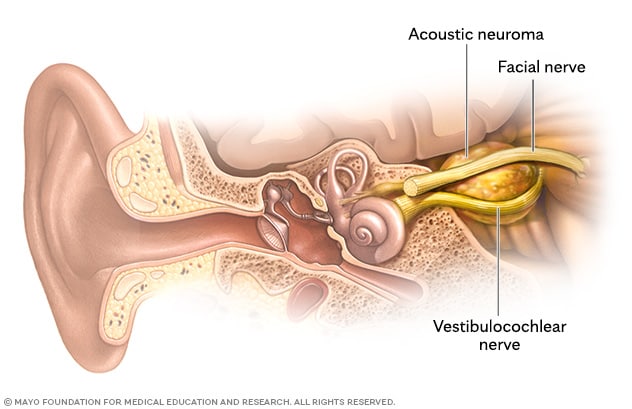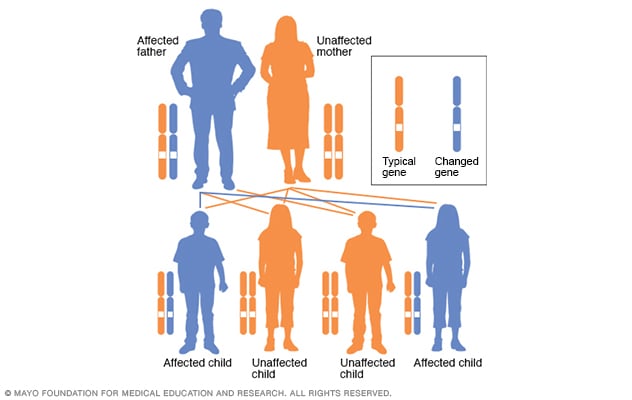Overview
Acoustic neuroma

Acoustic neuroma
An acoustic neuroma grows between the vestibulocochlear nerve and the facial nerve inside the inner ear canal. The tumor's pressure on these nerves can cause hearing loss, ringing in the ear and facial weakness.
An acoustic neuroma, now called vestibular schwannoma, is a tumor that develops on the main nerve leading from the inner ear to the brain. These tumors are considered benign, meaning they are not cancerous and they do not spread to other parts of the body. The affected nerve is called the vestibulocochlear nerve. There is one on each side of the head. The vestibulocochlear nerve directly affects balance and hearing. Growth from an acoustic neuroma can cause hearing loss, ringing in the ear and balance problems.
Acoustic neuroma can affect both ears but usually affects just one. Acoustic neuroma may cause numbness or weakness in the muscles on the affected side of the face.
Acoustic neuromas are a type of peripheral nerve tumors. They form from Schwann cells, which help protect and support nerve cells in the body, including the vestibular nerve. The vestibular nerve is part of the peripheral nervous system. Although acoustic neuromas grow inside the skull, close to the brainstem, they do not arise from brain tissue and are not classified as central nervous system tumors. Acoustic neuromas may sometimes be referred to as a type of benign brain tumor because of their location, but technically they are not brain tumors.
Acoustic neuromas usually are slow growing. Rarely, they may become large enough to press against the brain and affect vital functions.
Acoustic neuroma is a rare type of benign tumor. Each year, fewer than 1 in 20,000 people are diagnosed. The risk of developing acoustic neuroma increases with age. About 1 in 5,000 people over age 70 are diagnosed each year.
Treatments for acoustic neuroma include monitoring, radiation and surgical removal.
Symptoms
Symptoms of an acoustic neuroma, now called vestibular schwannoma, often are easy to miss and may take years to develop, as these tumors grow very slowly. Acoustic neuromas usually grow at a rate of about 1 millimeter a year. That is about the thickness of a credit card. Some may grow a little faster. But it's possible for some to stay the same size for years.
Acoustic neuroma symptoms may happen because of the pressure on the vestibular-cochlear nerve from the tumor. The tumor also can put pressure on the facial nerve that directs facial muscles and the trigeminal nerve that affects feeling in the face. This can lead to numbness in the face or difficulty moving the face. Acoustic neuroma generally doesn't cause neck pain. Blood vessels or other brain structures also can be affected by an acoustic neuroma.
As the tumor grows, symptoms may become more noticeable or may worsen.
Common signs and symptoms of an acoustic neuroma include:
- Hearing loss, usually gradually over months to years. In rare cases, hearing loss can be sudden. Hearing loss usually occurs on one side or is worse on one side.
- Ringing in the affected ear, known as tinnitus.
- Loss of balance or not feeling steady.
- Dizziness.
- Facial numbness and, very rarely, weakness or loss of muscle movement.
Hearing loss and acoustic neuroma
Hearing loss related to acoustic neuroma is considered sensorineural hearing loss. This means that the hearing loss is caused by damage to the inner ear or the nerves responsible for hearing, rather than some sort of buildup or blockage that affects hearing.
There can be a particular pattern to hearing loss caused by acoustic neuroma. Most people with an acoustic neuroma lose hearing in just one ear. About 9 out of 10 people with acoustic neuroma experience this.
Hearing loss that's related to acoustic neuroma often starts with trouble hearing higher pitched sounds. Difficulty hearing usually gets worse over time. For some people, hearing fades slowly over time. For others, it may decline more suddenly. Sudden hearing loss is rare. Sometimes hearing can partly come back. But typically hearing loss continues to decline, even if the tumor itself is not growing.
People with hearing loss from acoustic neuroma may find that they:
- Rely more on one ear to listen.
- Ask people to speak into their "better" ear in conversations.
- Find it hard to tell where voices are coming from.
- Struggle to follow conversations in crowded rooms.
- Feel that voices sound unclear or muffled even when the volume seems loud enough.
- Have ringing in the ears, called tinnitus.
Typically, acoustic neuroma tumors don't cause symptoms often seen with other brain tumors, such as headaches, memory loss, neck pain or thinking difficulties. These symptoms are rare and generally occur only if the tumor becomes large enough to press on nearby brain structures.
Rarely, an acoustic neuroma may grow large enough to compress the brainstem and become life-threatening.
When to see your doctor
See a healthcare professional if you notice hearing loss in one ear, ringing in your ear or trouble with balance.
Early diagnosis of an acoustic neuroma may help keep the tumor from growing large enough to cause complications such as total hearing loss.
Causes
Experts don't really understand what causes acoustic neuroma, now called vestibular schwannoma. In most people with an acoustic neuroma, there is no clear cause.
In some people, the tumor is linked to a change in a gene on chromosome 22. This gene makes a protein that helps control the growth of Schwann cells, which cover and protect nerves. When the gene doesn't work properly, these cells can grow out of control and form a tumor.
The gene change may be related to a rare condition called NF2-related schwannomatosis, also known as NF2. The condition used to be known as neurofibromatosis type 2. People with this condition usually have tumors on the hearing and balance nerves on both sides of the head. These tumors are known as bilateral vestibular schwannomas.
Risk factors
Acoustic neuroma, now called vestibular schwannoma, has one confirmed risk factor.
NF2-related schwannomatosis and acoustic neuroma risk
Autosomal dominant inheritance pattern

Autosomal dominant inheritance pattern
In an autosomal dominant inheritance pattern, the changed gene is a dominant gene. It's located on one of the nonsex chromosomes, called autosomes. Only one changed gene is needed for someone to be affected by this type of condition. A person with an autosomal dominant condition — in this example, the father — has a 50% chance of having an affected child with one changed gene and a 50% chance of having an unaffected child.
The only confirmed risk factor for acoustic neuromas is having a parent with the rare genetic condition NF2-related schwannomatosis, also known as NF2. However, only a small number of people with acoustic neuromas have NF2.
A hallmark feature of NF2 is the growth of acoustic neuromas on the vestibulocochlear nerve on both sides of the head. People with NF2 also may develop tumors on other nerves.
NF2 is known as an autosomal dominant condition. This means that the gene related to the condition can pass to a child from just one parent. Each child of an affected parent has a 50-50 chance of inheriting the gene.
Noise exposure and acoustic neuroma risk
Research shows that being around loud noise for many years may affect more than your hearing. It also may be linked to a slightly higher chance of developing an acoustic neuroma. The overall risk is still low. But these findings suggest that long-term noise exposure might influence your health in more ways than just causing hearing loss.
Complications
If an acoustic neuroma, now called vestibular schwannoma, grows larger or is left untreated, it can lead to complications. The most common complications involve hearing loss and balance issues. But larger tumors also may affect nearby nerves and brain structures, causing more serious health issues.
Common in many acoustic neuromas
- Hearing loss in one ear that is usually permanent.
- Ringing in the ear, also called tinnitus.
- Balance trouble or unsteadiness, sometimes with brief periods of vertigo.
More likely with large or untreated acoustic neuromas
- Facial numbness when the trigeminal nerve is affected, and facial weakness when the facial nerve is involved.
- Headaches or pressure caused by crowding of the brainstem.
- Worsening balance and walking difficulties, also called ataxia.
- Hydrocephalus, a buildup of fluid in the skull that can occur when a large acoustic neuroma blocks the flow of cerebrospinal fluid between the brain and spinal cord. Hydrocephalus raises pressure inside the head and can lead to upset stomach, vomiting, sleepiness or vision changes.
- Swallowing or voice changes, which may occur rarely if very large tumors affect lower cranial nerves.
Special situations
- In NF2, tumors can occur on both sides of the head, leading to hearing loss in both ears.
Nov. 11, 2025